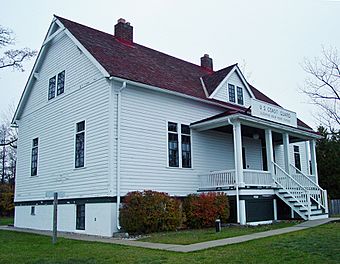Sleeping Bear Point Life Saving Station
Quick facts for kids |
|
|
Sleeping Bear Point Life Saving Station
|
|
 |
|
| Nearest city | Glen Haven, Michigan |
|---|---|
| Area | 2.1 acres (0.85 ha) |
| Built | 1901 |
| Built by | Robert J.B. Newcombe |
| NRHP reference No. | 79000285 |
| Added to NRHP | April 26, 1979 |
The Sleeping Bear Point Life Saving Station, also known as the Glen Haven Coast Guard Station, is a special building near Glen Haven, Michigan. It's important because it's a great example of an early design for these kinds of stations. It was added to the National Register of Historic Places in 1979. Today, it's called the Sleeping Bear Point Coast Guard Station Maritime Museum and is part of the beautiful Sleeping Bear Dunes National Lakeshore.
Contents
What Was a Life Saving Station?
Life saving stations were like emergency centers on the coast. Before modern rescue teams, brave people worked at these stations. Their job was to help sailors and ships in trouble near the shore. They would launch boats, rescue people, and provide first aid. It was a very important and often dangerous job!
A Look Back: History of the Station
Building the Station
The Sleeping Bear Point Life Saving Station was built in 1901. A builder named Robert J.B. Newcombe followed special plans from the United States Life-Saving Service. This service was a government group that helped save lives at sea. At first, local volunteers mostly worked at the station, ready to help.
Moving and Closing Down
The station was first built about a mile west of where it is now. But it was hard to get to that spot. So, in 1931, the United States Coast Guard moved the entire station to its current location. The Coast Guard is another government group that protects our coasts and helps people at sea.
During World War II, the station stopped its rescue operations. It officially closed its doors for good in 1958.
Becoming a Museum
After it closed, the station became part of the National Park Service. This is the group that manages national parks and special places like the Sleeping Bear Dunes National Lakeshore.
For several summers starting in 1971, the station was used as a visitor center for the Lakeshore. Then, in 1982 and 1983, most of the station was carefully restored. It was made to look just like it did in 1931. The inside of the boathouse and the crew's sleeping area were even restored to how they looked in the early 1900s. In the spring of 1984, the station opened again, this time as a maritime museum. Now, visitors can learn all about its history and the brave people who worked there.
What Does the Station Look Like Today?
The Sleeping Bear Point Life Saving Station has four main buildings. These include a house where the crew lived, a boathouse, a storage shed, and a signal tower.
The Crew's Residence
The main house is a two-story building. It sits on a strong cement foundation. The roof is shaped like an upside-down "V" and is covered with wooden shingles. A porch with four square columns stretches across the front of the house.
The Boathouse
The boathouse is also made of wood. Its sides are covered with vertical wooden planks. The roof is shaped like a pyramid and is also covered with wooden shingles. On top of the boathouse, there's a small, eight-sided tower called a cupola.



